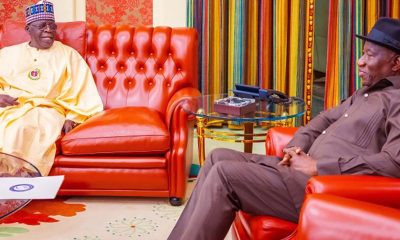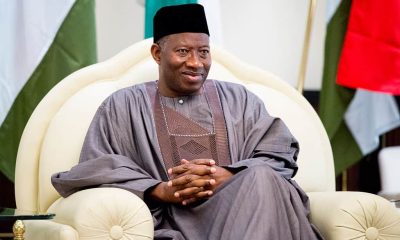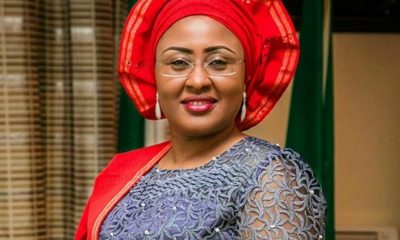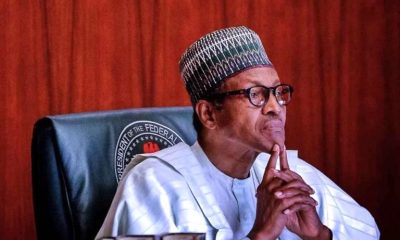Opinion
“New” national anthem is national self-debasement – Farooq Kperogi

“New” national anthem is national self-debasement – Farooq Kperogi
Nothing in my adult life has made me more ashamed to be a Nigerian and more inclined to completely divest my emotions from Nigeria than the readoption of “Nigeria, We Hail Thee,” a colonially created national anthem whose first stanza drips wet with the spit of racist condescension, gender exclusion, and stodgy, ungainly archaisms.
First, it’s inexcusable national self-humiliation to discard a home-made national anthem, irrespective of its defects, for one that was made by an imperialist whose influence we’re supposed to be independent of. That instantiates a phenomenon that social anthropologists call cultural cringe.
First propounded by an Australian scholar by the name of Arthur Phillips in the 1950s to describe Australia’s complicated cultural relations with Britain and the US, cultural cringe is the deep-rooted inferiority complex that causes psychologically damaged, formerly colonized people to inferiorize and disdain their own country and its culture and to uncritically valorize cultures and countries that their low self-esteem persuades them to believe is superior to theirs.
In previous columns, I have called this Nigeria’s national xenophilia, which I have defined as our predilection for irrational, unjustified, inferiority-driven veneration of the foreign and the corresponding sense of low national self-worth that this veneration activates.
A country whose symbolic song of independence is inspired, written, and composed by the appendicular remnants of imperialist oppressors of whom the country has supposedly been independent for more than six decades isn’t worthy of its independence. Such a country has lost the moral and philosophical argument for independence and against recolonization.
READ ALSO:
- Biden unveils Israeli proposal to end Gaza war
- Sad, Lagos APC chieftain dies in auto crash + Photos
- Trump reckless, saying hush-money trial was rigged – Biden
That is why, as I’ve argued in the past, our leaders are routinely infantilized by the West. As a people and a culture, we have internalized a mentality of low self-worth and an unwarranted veneration of the foreign, especially if the “foreign” also happens to be white. Nothing has demonstrated this more than the readoption of a national anthem that was written and composed by colonial British women.
But my worry transcends this. I am mortified that the very first stanza of our national anthem derogates our humanity. I have written multiple articles on what I have called the vocabularies of racial differentiation and exclusion in which I have repeatedly pointed out that “tribe” and “native” are racist words that white people reserve only for people they consider inferior, and that their appearance in Nigeria’s first national anthem was one of the reasons for the anthem’s rejection in 1978.
I’ll repeat some of the things I’ve written over the last few years on this issue and hope that President Bola Ahmed Tinubu sees reason to rescind the readoption of this denigrating British anthem written for Nigeria.
Shorn of all pretenses, “tribe” basically means backward, primitive nonwhite people. Let no one deceive you that the word means anything other than that in the English language. Even the Oxford Dictionary of English recognizes this fact. Its usage note on “tribe” reads:
“In historical contexts the word tribe is broadly accepted (the area was inhabited by Slavic tribes), but in contemporary contexts it is problematic when used to refer to a community living within a traditional society. It is strongly associated with past attitudes of white colonialists towards so-called primitive or uncivilized peoples living in remote underdeveloped places. For this reason it is generally preferable to use alternative terms such as community or people” (p. 1897).
I personally prefer “ethnic group” as an alternative to “tribe.” But I am aware that “tribe” has been congealed in our lexical repertory and can even be said to have been resemanticized by Africans, that is, given a meaning that is different from its original one.
READ ALSO:
- Aisha Yesufu under fire for ignoring new national anthem
- Ogun set for oil exploration, receives FG delegation
- Michelle Obama’s mother, Marian Robinson, dies at 86
For most English-speaking Africans, “tribe” is simply the English lexical equivalent of the words in their languages that they deploy to denote peoplehood. That may be so, but I come to language from a communication standpoint. To effectively communicate, you have to speak the same codes and share the same meanings.
Native English speakers would never call themselves “tribes” and understand the word to mean a group of primitive, nonwhite people who are still stuck at the lower end of the civilizational hierarchy.
You may understand the word differently, but if you tell a native speaker you belong to a tribe, you are inadvertently authorizing your inferiorization. That’s why when anybody asks me, “What is your tribe?” I always say, “You mean my ethnic group? I don’t belong to a tribe.” That was, by the way, Chinua Achebe’s attitude, too. He hated the word “tribe.”
That was also why when former US President Bill Clinton visited Nigeria and other African countries in 1998, experts told him to steer clear of the word “tribe” and its inflections such as “tribal,” “tribalism,” “tribalistic,” etc.
An influential American newspaper called Politico contrasted Clinton’s studied avoidance of the word “tribe” and Obama’s liberal use of it. “Keep in mind that the word ‘tribal conflict’ is extremely insulting to Africans,” the paper quoted a scholar by the name of Marina Ottaway of the Carnegie Endowment for International Peace to have told American reporters who would cover the presidential visit. “Don’t write about ‘century-old tribal conflicts in African countries’… Yet, when Obama uttered the phrase ‘tribal conflicts’ at a press conference Friday as he discussed his planned trip to Africa, it went virtually unremarked upon. So too did several references he made in his Ghana speech to battles among ‘tribes.’” “Another president,” the paper concluded, “might have been accused of racism…”
Well, I criticized Obama for this in a Jul 18, 2009, column titled, “The Anti-African Racist Insults Obama Got Away with in Ghana,” which attracted the attention of the White House at the time.
A column I wrote earlier on February 27, 2009, titled “What’s my tribe? None” got the attention of CNN International’s copy desk. After a back and forth with its Chief Copy editor, the organization banned the use of the word “tribe” from its style guide. It came from their admission that no white ethnic group would ever be called a “tribe.”
READ ALSO:
- BREAKING: Organised Labour declares indefinite strike over minimum wage
- Otti places N25m bounty on killers of soldiers in Aba
- JUST IN: 40 directors fail permanent secretary qualifying exam
In my September 30, 2018, column titled, “‘Tribe’ and ‘Detribalized’ are Derogatory Words,” I wrote: “Sadly, in 2018, our elites not only still call us ‘tribes’; they defend doing so. Lillian Jean Williams, the British colonial who wrote the anthem, would be proud.” I had no inkling that Tinubu would take this embarrassing sociolinguistic suicide to the next level.
“Native” is another linguistic marker of racial inferiorization that has no business being on Nigeria’s national anthem. The word was originally used by white colonialists and later by Western anthropologists to refer specifically to nonwhite people. The New Oxford American Dictionary (3rd edition) captures this subtlety well. One of the definitions of “native,” which the dictionary says is “dated, often offensive,” is “one of the original inhabitants of a country, especially a nonwhite as regarded by European colonists or travelers.”
Lillian Jean Williams was a British colonialist who thought herself superior to the “natives” and reflected that in the first stanza of the anthem she composed for us.
Notice, though, that in American (and Canadian) English “native” is used widely in a non-racially discriminatory way. When people call a city their hometown they often say they’re natives of the city, as in “I am an Atlanta native.” I am not sure how widespread this usage of “native” is in British English, but it appears only 148 times in the British National Corpus.
The New Oxford American Dictionary’s usage advice on “native” is instructive. It says, “In contexts such as native of Boston or New York in the summer was too hot even for the natives, the noun native is quite acceptable. But when it is used to mean ‘a nonwhite original inhabitant of a country,’ as in this dance is a favorite with the natives, it is more problematic. This meaning has an old-fashioned feel and, because of its association with a colonial European outlook, it may cause offense.”
There is exactly zero reason to revert to “Nigeria, We Hail Thee.” Its readoption symbolizes the starkest evidence of national defeat, national self-humiliation, and national inferiority complex that I have ever seen. If Tinubu doesn’t reverse himself on readopting this national disgrace, the next government should. This is simply unbearably embarrassing!
“New” national anthem is national self-debasement – Farooq Kperogi
Farooq Kperogi is a renowned Nigerian newspaper columnist and United States-based Professor of journalism.
Opinion
El Rufai’s Arise News mind game with Ribadu, By Farooq Kperogi

El Rufai’s Arise News mind game with Ribadu, By Farooq Kperogi
El Rufai’s Arise News mind game with Ribadu, By Farooq Kperogi
Opinion
Oshiomhole: Behold the 13th disciple of Christ

Oshiomhole: Behold the 13th disciple of Christ
Opinion
AFCON 2025: Flipping Content Creation From Coverage to Strategy

AFCON 2025: Flipping Content Creation From Coverage to Strategy
By Toluwalope Shodunke
The beautiful and enchanting butterfly called the Africa Cup of Nations (AFCON) emerged from its chrysalis in Khartoum, Sudan, under the presidency of Abdelaziz Abdallah Salem, an Egyptian, with three countries—Egypt, Sudan, and Ethiopia—participating, and Egypt emerging as the eventual winner.
The reason for this limited participation is not far-fetched. At the time, only nine African countries were independent. The remaining 45 countries that now make up CAF’s 54 member nations were either pushing Queen Elizabeth’s dogsled made unique with the Union Jack, making supplications at the Eiffel Tower, or knocking at the doors of the Palácio de Belém, the Quirinal Palace, and the Royal Palace of Brussels—seeking the mercies of their colonial masters who, without regard for cultures, sub-cultures, or primordial affinities, divided Africa among the colonial gods.
From then until now, CAF has had seven presidents, including Patrice Motsepe, who was elected as the seventh president in 2021. With more countries gaining independence and under various CAF leaderships, AFCON has undergone several reforms—transforming from a “backyard event” involving only three nations into competitions featuring 8, 16, and now 24 teams. It has evolved into a global spectacle consumed by millions worldwide.
Looking back, I can trace my personal connection to AFCON to table soccer, which I played alone on concrete in our balcony at Olafimihan Street—between Mushin and Ilasamaja—adjacent to Alafia Oluwa Primary School, close to Alfa Nda and Akanro Street, all in Lagos State.
Zygmunt Bauman, the Polish-British sociologist who developed the concept of “liquid modernity,” argues that the world is in constant flux rather than static, among other themes in his revelatory works.
For the benefit of Millennials (Generation Y) and Generation Z—who are accustomed to high-tech pads, iPhones, AI technologies, and chat boxes—table soccer is a replica of football played with bottle corks (often from carbonated drinks or beer) as players, cassette hubs as the ball, and “Bic” biro covers for engagement. The game can be played by two people, each controlling eleven players.
I, however, enjoyed playing alone in a secluded area, running my own commentary like the great Ernest Okonkwo, Yinka Craig, and Fabio Lanipekun, who are all late. At the time, I knew next to nothing about the Africa Cup of Nations. Yet, I named my cork players after Nigerian legends such as Segun Odegbami, Godwin Odiye, Aloysius Atuegbu, Tunji Banjo, Muda Lawal, Felix Owolabi, and Adokiye Amiesimaka, among others, as I must have taken to heart their names from commentary and utterances of my uncles resulting from sporadic and wild celebrations of Nigeria winning the Cup of Nations on home soil for the first time.
While my connection to AFCON remained somewhat ephemeral until Libya 1982, my AFCON anecdotes became deeply rooted in Abidjan 1984, where Cameroon defeated Nigeria 3–1. The name Théophile Abéga was etched into my youthful memory.
Even as I write this, I remember the silence that enveloped our compound after the final whistle.
It felt similar to how Ukrainians experienced the Battle of Mariupol against Russia—where resolute resistance eventually succumbed to overwhelming force.
The Indomitable Lions were better and superior in every aspect. The lion not only caged the Eagles, they cooked pepper soup with the Green Eagles.
In Maroc ’88, I again tasted defeat with the Green Eagles (now Super Eagles), coached by the German Manfred Höner. Players like Henry Nwosu, Stephen Keshi, Sunday Eboigbe, Bright Omolara, Rashidi Yekini, Austin Eguavoen, Peter Rufai, Folorunsho Okenla, Ademola Adeshina, Yisa Sofoluwe, and others featured prominently. A beautiful goal by Henry Nwosu—then a diminutive ACB Lagos player—was controversially disallowed.
This sparked outrage among Nigerians, many of whom believed the referee acted under the influence of Issa Hayatou, the Cameroonian who served as CAF president from 1988 to 2017.
This stroll down memory lane illustrates that controversy and allegations of biased officiating have long been part of AFCON’s history.
The 2025 Africa Cup of Nations in Morocco, held from December 21, 2025, to January 18, 2026, will be discussed for a long time by football historians, raconteurs, and aficionados—for both positive and negative reasons.
These include Morocco’s world-class facilities, the ravenous hunger of ball boys and players (superstars included) for the towels of opposing goalkeepers—popularly dubbed TowelGate—allegations of biased officiating, strained relations among Arab African nations (Egypt, Algeria, Tunisia, and Morocco), CAF President Patrice Motsepe’s curt “keep quiet” response to veteran journalist Osasu Obayiuwana regarding the proposed four-year AFCON cycle post-2028, and the “Oga Patapata” incident, where Senegalese players walked off the pitch after a legitimate goal was chalked off and a penalty awarded against them by DR Congo referee Jean-Jacques Ndala.
While these narratives dominated global discourse, another critical issue—less prominent but equally important—emerged within Nigeria’s media and content-creation landscape.
Following Nigeria’s qualification from the group stage, the Super Eagles were scheduled to face Mozambique in the Round of 16. Between January 1 and January 3, Coach Eric Chelle instituted closed-door training sessions, denying journalists and content creators access, with media interaction limited to pre-match press conferences.
According to Chelle, the knockout stage demanded “maximum concentration,” and privacy was necessary to protect players from distractions.
This decision sparked mixed reactions on social media.
Twitter user @QualityQuadry wrote:
“What Eric Chelle is doing to journalists is bad.
Journalists were subjected to a media parley under cold weather in an open field for the first time in Super Eagles history.
Journalists were beaten by rain because Chelle doesn’t want journalists around the camp.
Locking down training sessions for three days is unprofessional.
I wish him well against Mozambique.”
Another user, @PoojaMedia, stated:
“Again, Eric Chelle has closed the Super Eagles’ training today.
That means journalists in Morocco won’t have access to the team for three straight days ahead of the Round of 16.
This is serious and sad for journalists who spent millions to get content around the team.
We move.”
Conversely, @sportsdokitor wrote:
“I’m not Eric Chelle’s biggest supporter, but on this issue, I support him 110%.
There’s a time to speak and a time to train.
Let the boys focus on why they’re in Morocco—they’re not here for your content creation.”
From these three tweets, one can see accessibility being clothed in beautiful garments. Two of the tweets suggest that there is only one way to get to the zenith of Mount Kilimanjaro, when indeed there are many routes—if we think within the box, not outside the box as we’ve not exhausted the content inside the box.
In the past, when the economy was buoyant, media organisations sponsored reporters to cover the World Cup, Olympics, Commonwealth Games, and other international competitions.
Today, with financial pressures mounting, many journalists and content creators seek collaborations and sponsorships from corporations and tech startups to cover sporting events, who in turn get awareness, brand visibility, and other intangibles.
As Gary Vaynerchuk famously said, “Every company is a media company.” Yet most creators covering AFCON 2025 followed the same playbook.
At AFCON 2025, most Nigerian journalists and content creators pitched similar offerings: on-the-ground coverage, press conferences, team updates, behind-the-scenes footage, analysis, cuisine, fan interactions, and Moroccan cultural experiences.
If they were not interviewing Victor Osimhen, they were showcasing the stand-up comedy talents of Samuel Chukwueze and other forms of entertainment.
What was missing was differentiation. No clear Unique Selling Proposition (USP). The result was generic, repetitive content with little strategic distinction. Everyone appeared to be deploying the same “Jab, Jab, Jab, Hook” formula—throwing multiple jabs of access-driven content in the hope that one hook would land.
The lesson is simple: when everyone is jabbing the same way, the hook becomes predictable and loses its power.
As J. P. Clark wrote in the poem “The Casualties”, “We are all casualties,” casualties of sameness—content without differentiation. The audience consumes shallow content, sponsors lose return on investment, and creators return home bearing the “weight of paper” from disappointed benefactors.
On November 23, 1963, a shining light was dimmed in America when President John F. Kennedy was assassinated.
As with AFCON today, media organisations sent their best hands to cover the funeral, as the who’s who of the planet—and if possible, the stratosphere—would attend. Unconfirmed reports suggested that over 220 VVIPs were expected.
While every newspaper, radio, and television station covered the spectacle and grandeur of the event, one man, Jimmy Breslin, swam against the tide. He chose instead to interview Clifton Pollard, the foreman of gravediggers at Arlington National Cemetery—the man who dug John F. Kennedy’s grave.
This act of upended thinking differentiated Jimmy Breslin from the odds and sods, and he went on to win the Pulitzer Prize in 1986.
Until journalists and content creators stop following the motley and begin swimming against the tide, access will continue to be treated as king—when in reality, differentiation, aided by strategy, is king.
When every journalist and content creator is using Gary Vaynerchuk’s “Jab, Jab, Jab, Hook” template while covering major sporting events, thinkers among them must learn to replace one jab with a counterpunch—and a bit of head movement—to stay ahead of the herd.
Toluwalope Shodunke can be reached via tolushodunke@yahoo.com
-

 metro3 days ago
metro3 days agoIKEDC Sets Feb 20 Deadline for Customers to Submit Valid IDs or Face Disconnection
-

 Education3 days ago
Education3 days agoSupreme Court Affirms Muslim Students’ Right to Worship at Rivers State University
-

 News2 days ago
News2 days agoAso Rock Goes Solar as Tinubu Orders National Grid Disconnection
-

 metro2 days ago
metro2 days agoLagos Police Launch Manhunt for Suspect in Brutal Ajah Murder
-

 Business3 days ago
Business3 days agoNaira Could Trade Below ₦1,000/$ With Dangote Refinery at Full Capacity — Otedola
-

 International3 days ago
International3 days agoTrump Halts Minnesota Immigration Crackdown After Fatal Shootings, Protests
-

 metro3 days ago
metro3 days agoArmy University Professor Dies in Boko Haram Captivity After Nearly One Year
-

 Sports2 days ago
Sports2 days agoLookman Shines as Atlético Madrid Hammer Barcelona 4-0















